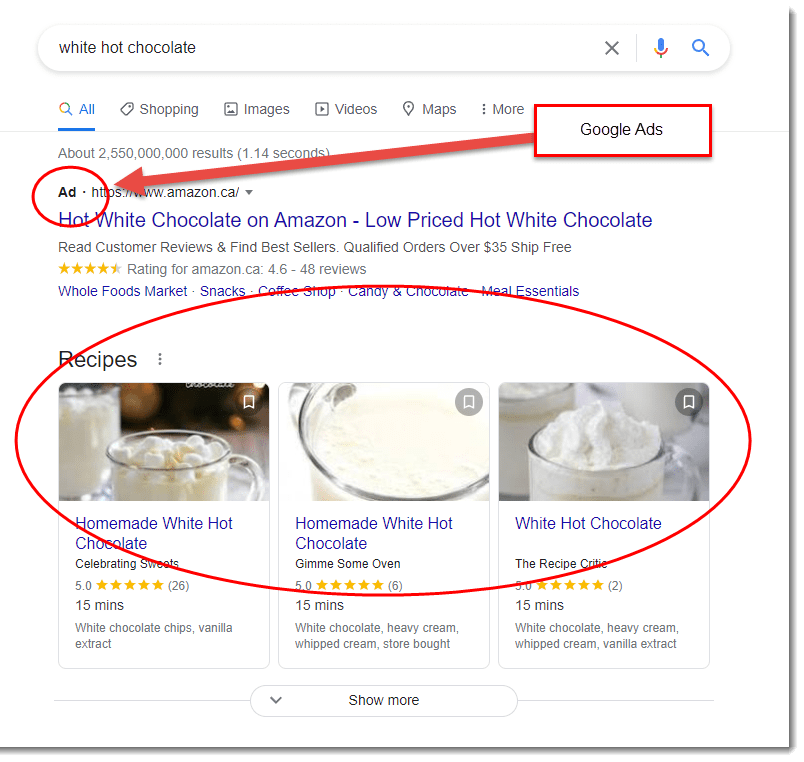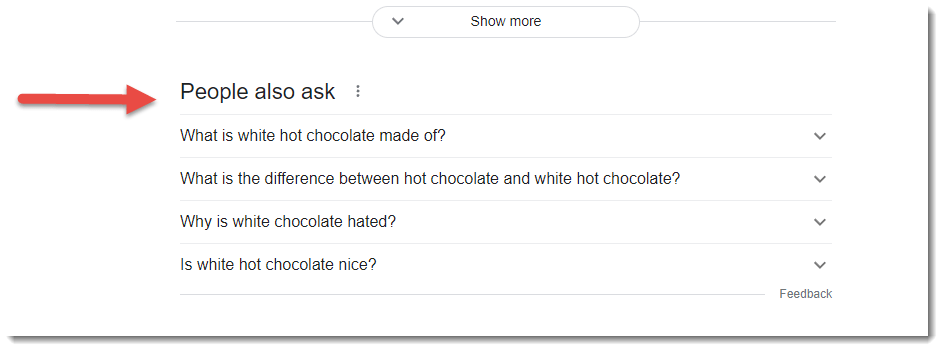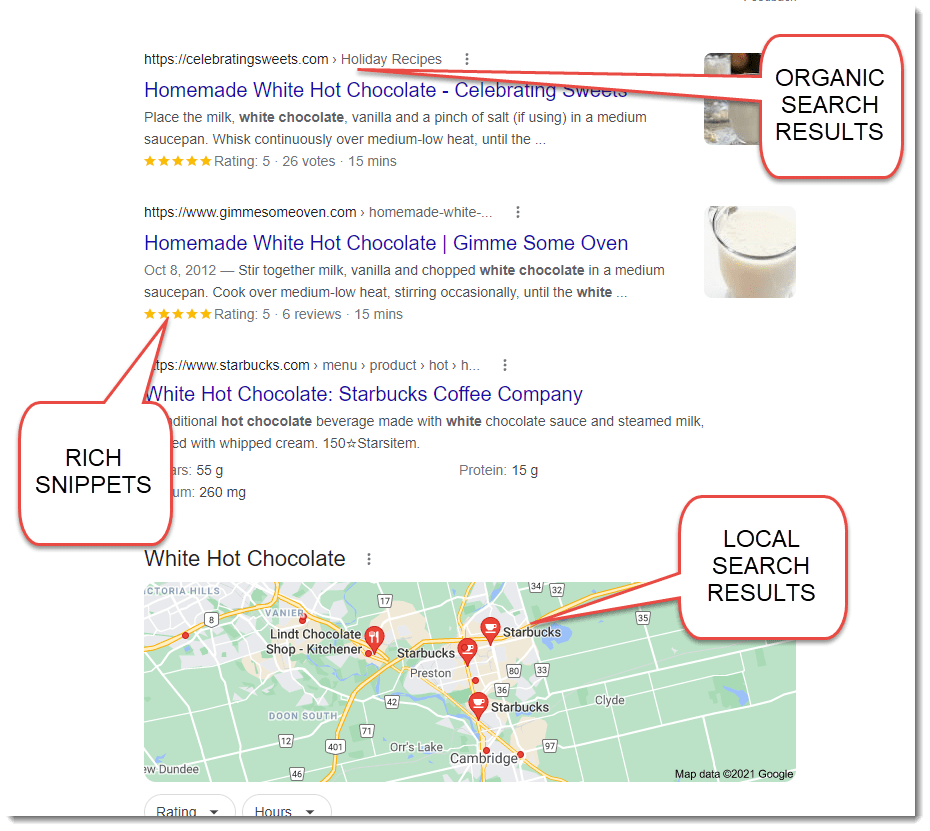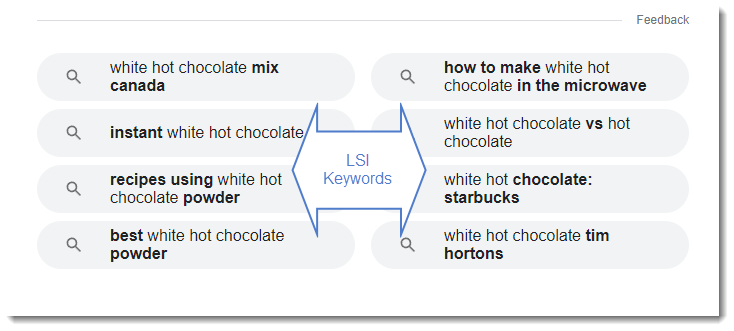The Value of the Focus Keyword in SEO
Often while collaborating with clients and explaining terminology for SEO, SEM and other search related items, I get asked, “what exactly is the focus keyword in SEO and why does it matter?” First, this is a great question and second, this is one concept that is critical to understand in any SEO project.
In today’s article, we are going to explore what is the focus keyword, why it matters for SEO, and how it is going to help improve the overall search index for your brand.
Let’s start first with a definition. In its simplest definition, the focus keyword in SEO is the subject matter for the intended page or post. By choosing a focus keyword and optimizing that webpage for that term, you can improve your index position in search and generate more traffic to your website.
Mock Example
I am going to create a mock example to quickly illustrate my point, using a café that sells white hot chocolate as a product.
Let’s say we are a small café located in a downtown urban area. We have a number of assorted products, and one of the products is a regular special on “white hot chocolate.” Ideally, we want people searching for products in the area surrounding the business to know that the cafe carries white-hot chocolate.
Now it’s safe to assume the local café has other products and that all of these products are listed on one page. We wouldn’t want to optimize the product page exclusively for white hot chocolate, because the other products would loose out. One solution is to give the product its own page.
In SEO, by creating individual pages about certain features or products of your business, you can optimize an individual page on your website to be more relevant for search results relating to that specific product, service, or feature.
By having a product page or blog post for white hot chocolate, you could improve your search indexing on the term white hot chocolate, which would boost your site in search results. This is where we get back to the focus keyword.
The Focus Keyword In SEO
A focus keyword in seo is the single word, phrase, or short sentence that you would like indexed in Google search results. To do this, we need to have our focus keyword in certain key areas of the webpage. Here are some key areas we want to have the focus keyword:
- Always Use focus keyword in SEO in the Meta title
- Use focus keyword in the Meta description
- Mentioned the focus keyword at least once or twice in the body of the content
- Use the focus keyword in the page URL
A couple of other key points to remember are, ensuring the focus keyword has search volume, and be certain to not overuse the focus keyword in the article so that the article reads unnaturally or sounds odd. Overusing the keyword is known as keyword stuffing and is not a good SEO practice. See the section below on Keyword stuffing for more information.
Keep these helpful points in mind when creating a page or blog post around your chosen focus keyword.
The Focus keyword in our mock example, will have its own page, will have the focus keyword in the title, the meta description and will placed a couple times through the article. Additionally, having the keyword in the URL will be of benefit.
Here is an example of what the hierarchy could look like for the focus keyword, White Hot Chocolate:
Page URL: white-hot-chocolate
Title of page: White hot chocolate
Meta Title: to include the term white hot chocolate
Meta Description: to include the term white hot chocolate.
Body of the content: to include white hot chocolate at least a couple of times.
Keyword Stuffing – a definite No!
Now, it might seem the logical next step is the load up the keyword “white hot chocolate” everywhere throughout the page. This is a bad idea.
That practice is known as keyword stuffing, and it can hurt your site’s ranking. It is critical to avoid this. An interesting side note, this was an SEO best practice about 10 to 15 years ago. – Right up until Google started slapping everyone’s sites out of Google search by rolling out quality updates like Panda.
Outbound Links & The Focus Keyword
Outbound links will help compliment your focus keyword. Provide some relevant outbound links to content related to the focus keyword, keeping the goal in mind to provide relevant information related to your focus keyword. The last thing you want to do is trap the user forcing them to close the browser to get off your site. The user can decide for themselves if they want to explore your site further or check out other resources on your site. If they have a pleasant experience on your site and find relevant information, they will come back.
Quick lesson on the anatomy of the SERP
With focus keyword White Hot Chocolate.
To illustrate, for the focus keyword of white-hot chocolate, here is what the results look like in Google. The result is known as the SERP or Search Engine Results Page. The current layout of the SERP for this search is,
- Ads at the top
- Recipes
- People Also Ask
- Organic Search Results
- A location of places that carry white hot chocolate
After the Ads, the first thing that comes up are an ad by amazon and a couple of recipes.
Top of the Mock Example SERP

People Also Ask Mock Example SERP
If I scroll down the page, I see the second part of interest, People also ask.

Organic Search Results Mock Example SERP
Further down, again we see even more info, and this is the organic search results and then the local business listings that serve hot chocolate

Related Searches Mock Example SERP
And then finally we see the related searches. These are the LSI Keywords.

LSI Keywords
LSI keywords are Latent Semantic Indexing terms. These are terms that the Google algorithm determines are closely related to the search results of the focus keyword and can be found at the bottom of the search results page under the heading, Related Searches.
The LSI keywords are as follows:
- white hot chocolate mix Canada
- instant white-hot chocolate
- recipes using white hot chocolate powder
- best white-hot chocolate powder
- how to make white hot chocolate in the microwave
- white hot chocolate vs hot chocolate
- white hot chocolate: Starbucks
- white hot chocolate Tim Horton’s
To start to optimize a page, we first need to determine the focus keyword. Once we have the focus keyword determined, we can use that in Google search to find the LSI keywords.
With the LSI keywords, we can then begin to determine the best structure of the content.
For our example company and the above-mentioned LSI Keywords, we want to have a section on the page of white-hot chocolate vs hot chocolate, white hot chocolate mix, recipes of hot chocolate powder and how to make white hot chocolate in the microwave.
This would give us a great starting point for a blog post on white hot chocolate.
Optimize for the SERP
Want to create some utterly amazing content for your website? Check out LSI keywords related to your focus keyword and see what the SERP (Search Engine Results Page) has to offer when you search for your focus keyword.
Then, create some amazing content related to your focus keyword. With our mock example company, I would include pictures of the product, a description, a couple of hot chocolate recipes, and LSI keywords related to the Google search result for the focus keyword.
In conclusion
Now by all means, this is not the be all and end all to optimize for Google Search. If I were doing SEO optimization for a local café that sells white hot chocolate, the focus keyword and LSI keywords are just the starting point.
It is the SERP (Search Engine Results Page) that determines the rest of our optimization process. In our white-hot chocolate example for a local café serving this product, we would want to optimize:
- Google My Business,
- optimize for “people also ask”
- add schema to pull in Rich results for local reviews about the café and the white-hot chocolate.
All this is beyond the scope of this article, however if you’re interested in learning more, stay tuned to our blog or get in touch with us. We are always happy to answer any questions you may have.
At Sociable Media, we are all about building online communities in search and social media channels, focused on the client brand. To have a sustainable community develop, blog posts and webpages are cornerstones in establishing a solid foundation. For more information on how we grow online communities, read our article, How to grow a meaningful online community.

